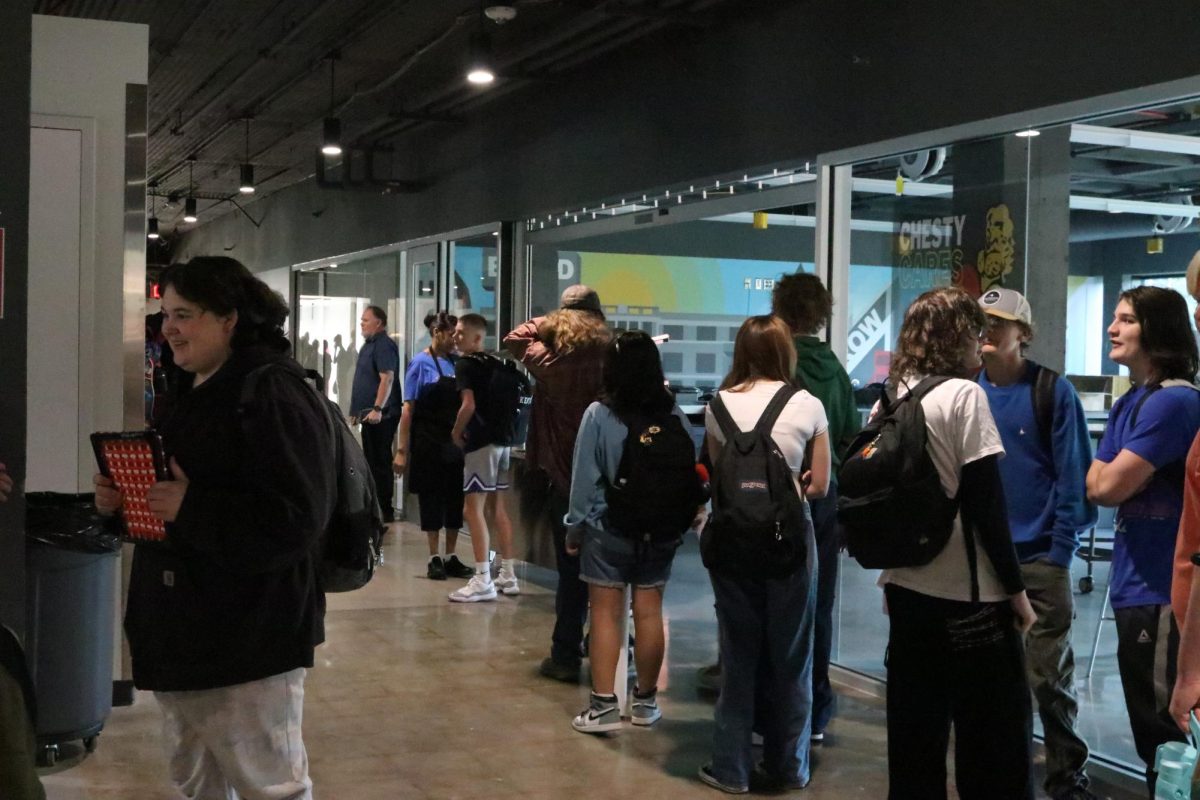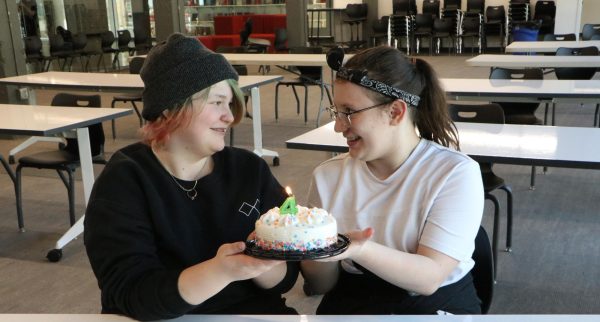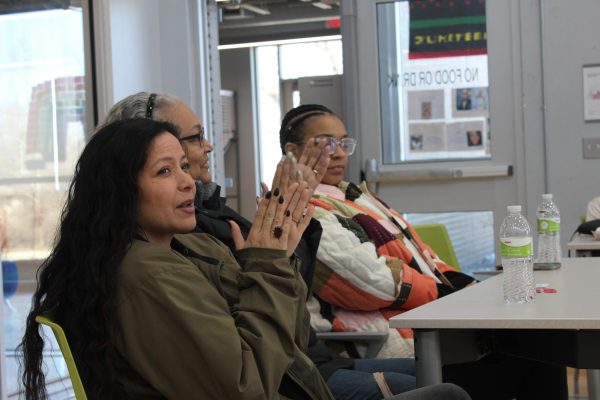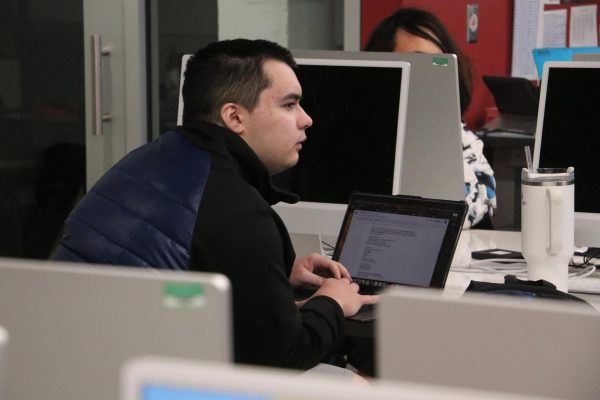Kansas involved in immigration discussion
State and national policies create issues for migrant relatives of US citizens
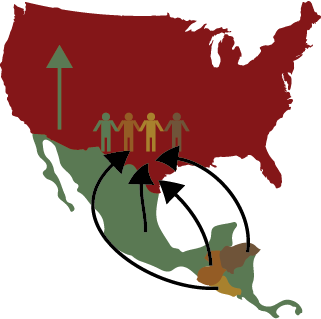
Graphic by Joaquin Dorado-Mariscal
November 18, 2014
When Lawrence High graduate Madina Salaty got married in 2012, she had no idea that her husband would be taken away from her just two years later.
Salaty’s husband, Zunu Zunaid was removed from the country after living and working in the United States for 20 years because of a DUI he received in 2006. The infraction of law had no repercussions until after he married a US citizen.
“It’s a sad reality that we don’t care about or even know about issues until it affects us,” Salaty said. “It is true for so many things. We just go about our lives until something affects us.”
Salaty and Zunaid are an example of the hundreds of thousands of families that are affected by separation due to immigration policy. Not only is this a national issue, but it affects students here at LHS.
“Usually [students dealing with familial separation experience] depression, anxiety, worry about what is going to happen to their family,” English as a Second Language (ESL) teacher Heather Lee said. “Because depending on where they are being deported back to… [it] isn’t really a safe place for people to be.”
People who move to Kansas from another country are primarily under the jurisdiction of the federal government. However states play a role in immigration policy as well.
“Lots of states try to have rules and regulations for immigrants, but for the most part, decisions about who can stay and who can go are not made at the state level. They are made at the federal level,” KU immigration law professor Lua Yuille said. “That does not mean that states cannot have any impact on the lives of the immigrants in their communities.”
Although Kansas is a conservative state, Yuille explains that opinions on the issue differ among conservative politicians.
“Within the conservative establishment, conservative politicians view the issue differently,” she said. “Merely being in a conservative state isn’t enough to tell you what the prevailing approach might be.”
In recent history, Kansas has taken an active role in the national immigration discussion, according to Yuille. She said that this is largely because of Secretary of State Kris Kobach has taken an active role in the subject across the country.
“I think right now Kansas — not wholly, but largely because of Secretary of State Kobach’s expertise and his prior experience — is starting to have that conversation,” Yuille said. “It will be interesting to see where Kansas stands. Kobach has been at the forefront of approaches like ones practices in Arizona.”
The state of Arizona is highly-publicized for having hard-line policy on tracking down unauthorized immigrants. In Kansas, Kobach has championed tougher voter ID laws that purport to ensure all voters are U.S. citizens, although critics say they threaten to suppress minority and underrepresented voters.
Although laws are subject to change as time goes on, the state remains uniform with the majority of the country in the issues it is facing regarding immigration policy.
“I actually think…. that the biggest issues facing Kansas are the same issues facing the rest of the country, and that is really about creating an internal legal system that is prepared to deal with the inevitably changing face of our nation.”
Immigration policy is generally a complex and controversial issue because of its constitutional ambiguity.
Recently, immigration issues have occupied national — but not necessarily state — headlines. The United States is facing an influx of immigrants who could bring the issue to the forefront, since the migrating population includes 70,000 unaccompanied children.
Primarily coming from Mexico, El Salvador, Honduras and Guatemala, waves of the juveniles have flowed into southern Texas, and are currently being housed at temporary settlement camps, but they cannot stay there. At least not all of them.
As a solution, many states, Kansas included, will be expected to take on some of the population. Yuille suggests that this will catalyze a greater focus on immigration in the state.
“Texas is not prepared to have 70,000 [unaccompanied children]… in the long-long-term. All the other states are going to be asked to step up,” Yuille said. “States like Kansas, who are close to Texas, and we don’t necessarily have our own population of unaccompanied juveniles to deal with may be asked to step up. As that starts happening, the word is going to get out, and there is going to be a possibility is going to be a hot-button issue.”
One of the primary goals of the current US immigration policy is to reunite separated families. However this concept does not protect all groups of people who arrive. For example, it doesn’t apply to homosexual couples or extended family members like aunts and uncles.
“Now what’s interesting in that idea of family reunification is the definition of family,” Yuille said. “It’s somewhat narrow — at least in modern terms.”
Since her husband’s removal, Salaty has become an activist for immigration policy reform. She frequently gives talks around northeastern Kansas about the issue, and seeks out families that have experienced similar hardship.
“Because of what was happening to me, I started reaching out to find out if there were other people facing this,” she said. “I really got hit in the face with the reality that there are tens of thousands of people out there facing this.”
In addition to informing people about the issue, Salaty has gotten behind a bipartisan initiative called American Families Unite, which calls for the federal enforcement of an in-person court review for each immigrant-related case.
American Families Unite asserts that if an unauthorized migrant is married to or a direct relative of a US citizen, they are entitled to a hearing with a federal judge, who will decide the case only after hearing the testimony.
“It doesn’t give you a green card, they won’t not deport you, but you have the right for a judge, a human, to hear your case in person. Its not that way now,” Salaty said.
To set the plan into action, Salaty has met with Congresswoman Lynn Jenkins in an attempt to persuade the Kansas delegation to bring it to Congress. So far, Jenkins has not cooperated with the request.
“She is going with what she thinks her constituents want,” Salaty said. “My argument is that she is only hearing from this very extreme faction, and I want more people to learn about this issue and say, “that’s messed up, separating families… why shouldn’t my representative do something about it?’”
Salaty attributes much of the stagnation in policy change to a general lack of knowledge in the community, particularly among young people.
“I’ll take any 18 year-old kid at Lawrence High School, who could go vote in November, and say, ‘Do you know anything about immigration reform issues?’ They would probably say no,” she said. “I didn’t know anything about it… until it happened to me, I don’t blame them for it. But I want to educate people on it now.”







